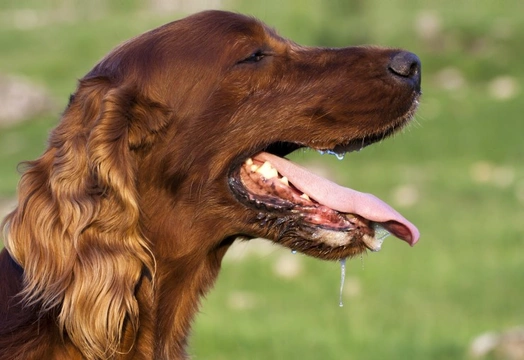
Excessive salivation and drooling in the dog
Certain types of dogs are natural slobberers, and can generally be found with a significant amount of slobber around their muzzles, or strands of drool hanging from the sides of their mouths! This trait will often become particularly pronounced when the dog is exercising, playing or excited, and owners of such dogs will be all too familiar with spending most of their lives with their clothes covered in dog slobber!
Drooling and slobbering is a breed-specific trait for many dogs, including a lot of brachycephalic breeds such as the boxer, and large, heavy dogs with drooping jowls like the Saint Bernard.
If your dog is a slobberer who always has a liberal coating of spit around their faces, this is something that you will come to realise and acknowledge as normal very quickly-but what if your dog is not prone to a lot of drooling or slobbering, and suddenly seems to be salivating a lot or drooling uncontrollably? This can indicate a health problem or potential risk, and so, should not be overlooked.
In this article, we will look at what drooling or excess slobbering can mean in dogs that do not normally do so, and how to proceed. Read on to learn more.
Learn your own dog’s norms
As mentioned, some dogs drool and slobber constantly, and this is perfectly normal for them! In most cases, this is a breed-specific trait that can be directly attributed to the shape and construction of the dog’s muzzle, which is why so many brachycephalic breeds slobber a lot. A brachycephalic face or long, drooping jowls generally make for a future drooler, and if your dog falls into this category, slobbering over everything is probably their normal state of affairs!
Sometimes, dogs with a normal-length muzzle and normal jaw construction will slobber more than the usual amount too, and this can sometimes be caused by things like missing teeth or poor dental hygiene, and so is worth getting this checked out by your vet before you can truly regard it as the normal state of affairs for your dog.
What causes sudden excessive drooling?
If your dog is not one of the breeds that is apt to slobber a lot all of the time, or if they are not generally fairly slobbery and excessive drooling is a new thing for them, there is a good chance that something is wrong with your dog, which merits further investigation.
One of the most common causes of excessive, out or character drooling in dogs is the ingestion of toxins or poisons, which we will look into in more detail within the next section.
However, excessive slobbering can potentially indicate a wide range of different possible issues, some of which are very serious and require prompt veterinary attention.
In elderly dogs or those that are known to have compromised liver function, going into end-stage liver failure can lead to excessive drooling, generally accompanied by weakness and lethargy, and often, jaundice. The same is true of kidney failure, and very often, excessive salivation can be attributed to an underlying problem with the liver or kidneys, which will require prompt veterinary intervention.
Another serious condition that is acute in onset and leads to a lot of slobbering is GDV or bloat, in which the stomach of the dog becomes full of trapped gas that pinch off the entry and exit to the stomach, and which is a veterinary emergency as it can lead to the stomach twisting.
Bloat is usually accompanied by other symptoms including generalised discomfort in the stomach region which may present as sitting or standing awkwardly, or appearing preoccupied with the stomach area. Bloat is a veterinary emergency, and requires immediate treatment.
Be alert to the signs of poisoning
One of the most common causes of excessive salivation and out of character drooling in the dog is due to the ingestion of poison or toxins, which can affect the liver, kidneys or both.
Slobbering as a side effect of poisoning or toxin ingestion generally occurs in acute cases, which are fast in onset and display a range of symptoms within just hours or even minutes of ingestion. This can happen if your dog has drunk antifreeze, some other caustic household chemical, poisons such as rodenticide, or has eaten something that is toxic to dogs such as chocolate or nicotine.
Poisoning in the dog generally presents with a range of very clear symptoms as well as slobbering or excessive salivation, and some of the most common of these include:
- Generalised lethargy, reluctance to move, and a lack of responsiveness.
- Vomiting or attempting to vomit.
- Potentially, diarrhoea.
- Collapse or fainting.
- Disorientation and confusion, which may manifest as aggression.
- Acute signs of pain, either around the stomach region or in general.
- Potentially, seizures or even coma.
Toxins and poisons affect the liver and kidneys, and can lead to total liver or kidney failure in the affected dog, which can in turn lead to a very painful death.
If you know or suspect that your dog has been poisoned or ingested a toxin, or if they are salivating heavily in accompaniment with some of the above symptoms, contact your vet as an emergency and ensure that they are seen promptly.



